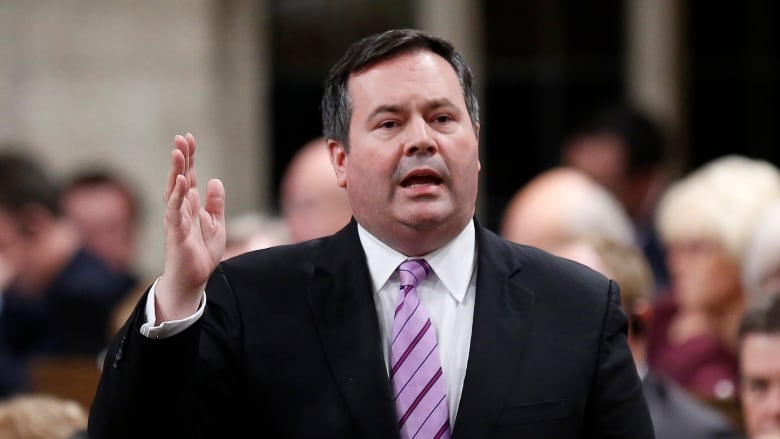As he leaves Ottawa to run for Alberta's PC leadership, Kenney says 'there's no going back'
Tells current flock of MPs to respect Parliament, go off script and ditch canned speeches

After 19 years as an MP, former defence minister Jason Kenney will leave the House of Commons this week, and when he does, "there is no going back."
Kenney made the pledge in an interview with CBC News Network's Power & Politics in his Parliament Hill office surrounded by packing boxes.
Kenney, who was also immigration minister, will try and win the Progressive Conservative leadership in Alberta on his way to uniting the PCs and Wildrose parties under one conservative banner.
"I will be the first, the only elected legislator in Canadian history to resign his or her seat at the beginning of a leadership process. For me, there is no going back," he told host Rosemary Barton.
- Kenney says he will pursue unity with Wildrose even if PC party rejects merger
- Kenney weighs in on Alberta LGBTQ education dispute
- Jason Kenney critical of Alberta PC leadership race rules, but will 'happily comply'
Kenney said he is leavingthe Tories better positioned than any Conservative opposition has been in more than 100 years.
"We have more seats, a bigger opposition, certainly a much bigger presence from Quebec, and as a party, we are organizationally in better shape from everything from fundraising to personnel," he said.
Going forward Kenney said his party will have to be mindful of the changing electorate, especially the influence that millennials have had not only in JustinTrudeau'selectionvictory, but in the campaigns of Democratic primary candidateBernie Sanders in the U.S. and Labour LeaderJeremy Corbyn in the U.K.
"There's a different political temperament in many members of that generation, that we have to get our head around for sure," he said.
No niqab regrets
Kenny described his departure as "bittersweet" saying he has fond memories of his time in Ottawa and will miss the issues he's worked on, and the people he has worked on them with.
One of those issues was his decision in 2011 to banface-covering clothing such as niqabs and burkas when onetakes the oath of citizenship. That ban was struck down by a Federal Court in early 2015 but the Tories asked the Supreme Court of Canada to review the decision and made an issue of it during the 2015 federal election campaign.
Combined with the Conservatives campaign announcement of a barbaric cultural practices tip line, and the measures brought in to revoke citizenship from dual-nationals convicted of terrorism, the niqab exploded into the federal election and quickly saw the Tories accused of starting a culture war.
But does Kenney regret the move?
"No absolutely not," he said.
"I made that announcement in 2011, following a roundtable with Muslim Canadian woman in Montreal, who unanimously applauded the decision," he said.
Kenney said that, despite the heat the niqab brought down on the Tory campaign, that polls showed between 65 and75 per centpublic support, for banning the niqab, "with disproportionately high support among new Canadians," he said.
"As Mark Twain said, sometimes a lie can get halfway around the world before the truth can put its boots on, that's the kind of context in which we were operating, and perhaps we didn't foresee that degree of cynicism by our adversaries, perhaps we ought to have," he said.
Growing the new Canadian vote
Kenney's outreach to immigrant and ethnic communities in Canada is largely credited with helping the party win a majority in 2011. Courting those demographics was not seen as a path to victory in years past but in 1994, over dinner with Stephen Harper, Kenney made his case.
"I was in town here visiting as the president of the Canadian Taxpayers Federation and we went off to watch Pulp Fiction," Kenney said. "I thought it was pretty cool, [Harper]was totally disgusted.
"After that, we sat down and had dinner at the Mayflower Pub ... and Isaid, 'You know Stephen, we're never going to be a governing coalition unless we're the party of new Canadians.'"
Kenney said Harper was skeptical because up until that point the Liberals had sewn up the immigrant vote, but Kenney pressed the casethat there was a natural alignment between immigrants and conservative values.
"We managed to double our vote among new Canadians from about 21 per cent in the 2004 election to 43 per cent in 2011 election, which undoubtedly was the key element in us winning a majority government in suburban areas around Vancouver and Toronto, for example," he said.
Honour the House
As he puts those issues behind him, Kenney says what he will miss most about being a MP is the cut and thrust of debate in the House of Commons."Sometimes I get frustrated, I mean that's the nature of debate. But that's the core of the institution, I absolutely love it," he said.
"There has been a diminishment of the roleof Parliament," Kenney said. "MPs, ordinary backbench MPs, have participated willingly in that. So one message I would give to my colleagues from all parties, as I leave this place, is treasure this institution,learn its history, understand your prerogatives.
"You, as an MP, can vote much more freely than you do. You can be more forceful, you can go off script, you don't need to read a canned speech given to you," Kenney said.













_(720p).jpg)


 OFFICIAL HD MUSIC VIDEO.jpg)
.jpg)



























































































